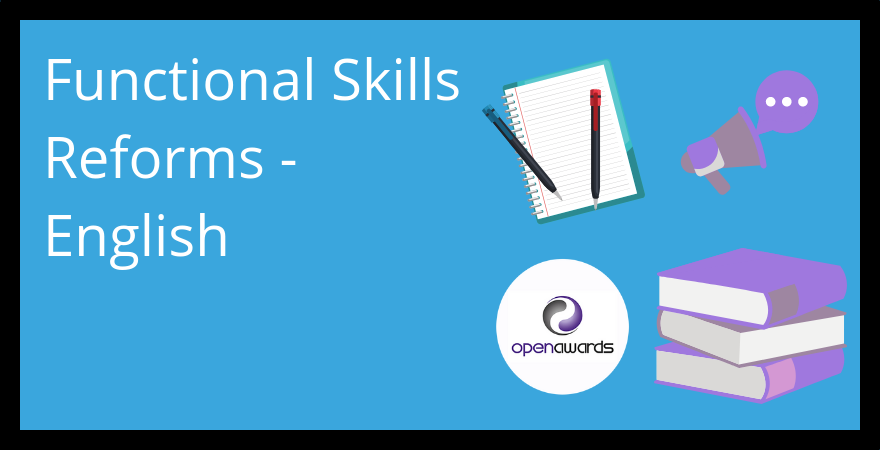
Reformed Functional Skills Qualifications in English and Mathematics will be available to teach on 1st September 2019.
The Department for Education and Ofqual have consulted on, and confirmed their overall approach to regulating these new Functional Skills Qualifications. Although there are a number of changes from the current FS Qualifications, some aspects have remained the same. There are however, a number of challenges that centres do need to be made aware of before 1st September 2019.
Open Awards are in the process of developing the reformed Functional Skills Qualifications at Entry Level 1 – Level 2.
Let's take a look at English
What has not changed?
The Reformed Functional Skills Qualifications continue to:
- Contain the three components of Speaking, Listening and Communicating, Reading and Writing, which all need to be successfully passed to achieve the overall award of English.
- Enable each level to build on the skills of the previous levels and encompass the skills of the previous levels.
- Have assessments that will be accessible, flexible and varied to meet learner needs.
- Ensure that Level 1 and Level 2 assessments will be externally set and externally marked, apart from the Speaking, Listening and Communication component which will still be internally assessed by the centre and externally moderated by Open Awards.
- Enable Entry Level 1-3 assessments to be externally set but internally marked by the Centre, with SLC internally assessed and externally moderated by Open Awards.
What has changed?
Speaking, Listening and Communication
There has been a change to the definition of a Speaking, Listening and Communication assessment. The current definition is:
Speaking, listening and communication within Functional Skills qualifications are defined as non-written communication, normally conducted face-to-face.
The new definition is as follows:
Speaking, listening and communicating’ within Functional Skills English qualifications is non-written communication, normally conducted face-to-face and can also include ‘virtual’ communication methods such as telephone or spoken web-based technologies.
This new definition allows the use of remote ‘video-chat’ technology such as video-phoning, video-conferencing, ‘Skype’, etc.
Our approach to this will be to develop assessments that have:
- One externally set or centre devised task (with a range of 15-30 minutes duration).
- A mix of activities and discussions at Entry 1 – Level 1, and the introduction of a presentation at Level 2.
- A scoring system whereby all pass criteria must be achieved.
Reading
There has also been a change to the definition of the Reading component. The current definition is:
The independent decoding and understanding of written language and text in a purposeful context. 'Text' is defined as materials that include the use of words that are written, printed, on screen or presented using Braille.
The new definition is as follows:
The independent understanding of written language in specific contexts. This can be demonstrated through the use of texts on screen or on paper.
Our approach to this will be to develop assessments that have:
- One externally set, externally marked assessment, either online or paper-based, which has a total of 30 marks with a 1 hour duration for Levels 1 and 2.
- One externally set, internally marked assessment, externally moderated assessment (paper-based only) with a 45 minute duration.
- A Pass/Fail result.
- An allowance for a dictionary.
Writing
With regard to the writing component, the current definition reads as follows:
The independent construction of written text to communicate in a purposeful context. 'Text' is defined as materials that include the use of words that are written, printed, on screen or presented using Braille.
The new definition is as follows:
Write texts of varying complexity, with accuracy, effectiveness and correct spelling, punctuation and grammar and understand the situations when, and audiences for which, planning, drafting and using formal language are important and when they are less important.
These changes mean that learners will need to:
- Spell, punctuate and write grammatically without use of dictionaries, and spelling or grammar checkers.
- Spend more time learning the underpinning knowledge and skills to communicate well.
Our approach to this will be to develop assessments that have:
- One externally set, externally marked assessment, either online or paper-based, which has a total of 60 marks with a 1 hour duration for Levels 1 and 2.
- One externally set, internally marked assessment, externally moderated assessment (paper-based only) with a 1 hour duration for Entry Levels 1-3.
- A Pass/fail result.
- No spell checker, grammar checker or dictionary allowed.
Challenges for centres and providers:
Delivery of the Reformed Functional Skills require centres and providers to consider the:
- Increased challenges for learners to demonstrate independent competence across the range of skills.
- Greater expectation for learners to ‘perform’ to the required level.
- Requirement for structured spelling, using phonics, being a core aspect at all levels.
- Different format and structure of the specifications and subject content.
- Specific qualification content - this must be fully covered to support successful end assessment.
In order to assist centres and providers, Open Awards will be running workshops in the near future to look at the delivery of the Reformed Functional Skills. The first workshop is on Thursday 7th March 1-3pm at our head office in Speke. In the meantime, if you have any concerns, please contact the team on [email protected] or 0151 494 2072.
